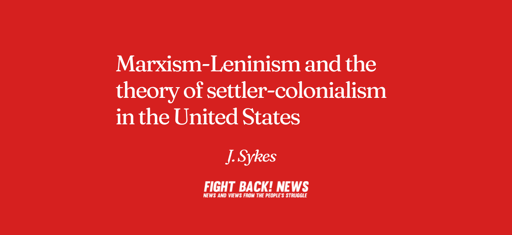To put it as plainly as possible, if the proponents of the U.S. settler-colonialism theory are correct, then there is no basis whatsoever upon which to build a multinational working class communist party in this country. Indeed, such a view sees the “settler working class” as instruments of colonialism, hostile to the interests of the colonized people, rather than viewing all working and oppressed people as natural allies in the struggle against imperialism, our mutual oppressor.
A shame, a sad sad shame. For anyone that’s read settlers, or knows about the history of labor zionism, or prioritizes any kind of indigenous voice in their praxis, this is really bad. No peace for settlers! Settlers cannot lead the revolution! I hope we see an end to any respect given to this “settler colonialism is over” politic soon.


I think my main issue with your stance here is that it’s based much more in absolutism than actual material conditions.
What does settler colonialism provide for its benefittors? Well, as they themselves will often say, land. I resent the term “reset” but settler colonialism is the closest humanity gets to actually turning back time in class society. It slows down the centralization of capitalism and allows for the creation of a large petite landowning population. Of course as well it makes room for large immigrant populations who are generally more friendly to being the exploited proletariat than either the conquered peoples or the settling population.
The problem is, how much does the American proletariat benefit from these things today? How easy is it for a American proletariat to gain land, how many resources remain completely untapped and can be exploited to increase the rate of profit? Etc.
This isn’t to say that America and Americans don’t benefit from the legacy of settler colonialism, but I agree with the CPUSA that it is not the primary contradiction. It certainly is an existing contradiction, but it isn’t the primary one that determines the material conditions of the American proletariat.
tf lmao
colonialism as whole is a necessary precondition to modern capitalism and imperialism. it is, in absolutely no way, a setback to capitalism and is in fact the only reason global capitalism and western dominance was possible at all
is this what yankee communists actually believe?
I was writing this at like, 3 in the morning dude cut me some slack.
What I mean is that, essentially, class divides are lessened between the classes of settler colonialists. You can see this in Israel, for instance, in that white Israelis get to live in “socialist” kittibutzes (however you spell that infernal thing) while underpaid migrant workers and such do much of the work. Ergo it gives white Israelis much more economic and consequently political and social freedom compared to those oppressed people’s.
In the same way imperialism uses super exploitation to create a labor aristocracy. Settler colonialism does something similar with land. If you were a poor prole in America, an option you had was to “go west young man.” Land monopolization could be delayed in the western terroritories with the expulsion of natives, while the labor power could be bought cheaper from the waves of immigrants from Ireland, Italy, etc.
This isn’t to say that it was “good” or avtually slowed down capitalism at all, in fact I’d argue, concurrently with you, that it did indeed speed up the adoption of capitalism. Its a complete mischaricterization of my response. Class conflict and monopolization still occurred, and mainly occurred in the states settled earliest that weren’t dominated by slave owning plantations (like new York, Philadelphia, Ohio, Michigan, etc.) However i argue that it occurred to a lesser extent because of the lack of resource competition on the continent, along with the aforementioned boons of settlement and such. This is my general explanation for the lack of class consciousness for much of American history (combined with other factors of course). I use “reset” as a term in comparison to other states on the two continents. In Mexico and other Spanish colonized states, the encomienda system made lesser even the people considered Spanish who did not come from Spain. Of course they held a higher position than slaves and indigenous peoples, but the land owning class was quickly centralized (at least in comparison to the United states). And so class conflict was accelerated in these nations. I’d argue that you can even see this in the American south, where instead of Yeoman farmers you had the slave ran plantations which stifled the growth of capitalism in these areas.
Ergo, what I was arguing in my comment is that, while the legacy still exists, the American proletariat no longer profits primarily from settler colonialism. Rather I say they benefit mainly from imperialism, same as in Europe (i.e, France and Britain). So while I do think that white Americans definitely benefit from the latent boons, it is just as possible for white Americans to be as revolutionary as white Brits or French people in comparison to Israelis because the class contradictions between them and the Bourgeoisie are greater than the material differences between the white proletariat and the black, Latino, etc. population.
This is of course not ignoring the labor aristocracy created by imperialist super profits and such, and so them being revolutionary is unlikely, but not as impossible as, say, a 1900s Boer or modern Israeli.